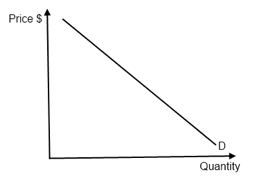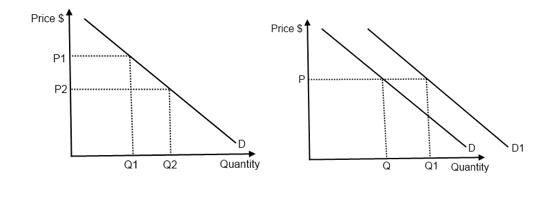Demand
The law of demand
Demand: is the total amount of goods and services that consumers are willing and able to purchase at a given price in a given time period.
The Law of Demand: states that "as the price of a product falls, the quantity demanded of the product will usually increase, ceteris paribus".
The demand curve
Demand curve: represents the relationship between the price and the quantity demanded of a product, ceteris paribus.

Figure 1.1 - A demand curve
The non-price determinants of demand (factors that change demand or shift the demand curve)
The non-price determinants of demand (shifting) for normal & inferior goods:
- Income: As income rises
- demand for normal goods rises, demand curve shifts to the right
- demand for inferior goods falls, demand curve shifts to the left (when income gets to certain level, demand will become zero and so the demand curve disappears)
- Taste & Preferences: Change in tastes in favor (i.e. advertising campaign) demand curve shifts to the right
- Price of substitutes and complements:
- As price of substitutes increases (movement along the curve) the demand shifts to the right
- As price of complements increases (movement along the curve) the demand shifts to the left
- Demographic changes: if population grows, the demand for most products will increase, thus the demand curves shift to the right?more will be demanded at each price level
Movements along and shifts of the demand curve
Movement along the demand curve:
- A change in price of the good itself leads to a movement along the existing demand curve (price is the axes), while a change in any other determinants of demand will always lead to a shift of the demand curve to either left or to the right.

Figure 1.2 - Movement along and a shift of the demand curve
Linear demand functions (equations), demand schedules and graphs
Linear demand functions:
Where:
- a = quantity demanded when price is zero
- b = slope of the curve
|
Price $ |
Calculation |
Quantity demanded |
|
0 |
|
60 |
|
1 |
|
55 |
|
2 |
|
50 |
If:
- a changes → shift of demand curve
- b changes → change of steepness of demand curve
